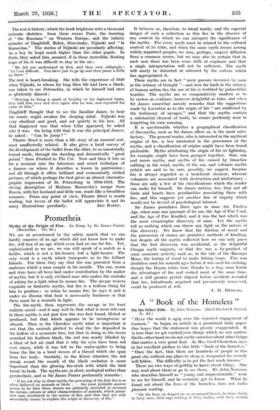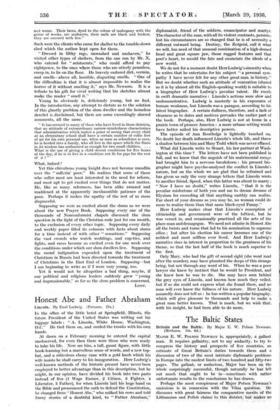A " Book of the Homeless "
" HALF the world is agog over the reported engagement of Camera." So began an article in a prominent daily paper. One hopes that the statement was grossly exaggerated. It is true that we get excitedover things which do not matter. On the other hand we do not excite ourselves about other things that matter a very great deal. As Mrs. Cecil Chesterton says, in her excellent preface to this little " book of the homeless," " Once the fact, that there are hundreds of people in this great city without any place to sleep, is recognized the remedy will follow. The difficulty is to get the fact made known."
There are two ways of getting to know about things. One may read about them or go to see them. Mr. John Newsom, who describes himself as " young and impressionable," went to see for himself, and he certainly got to know. What he found out about the lives of the homeless does not make pleasant reading.
" On the floor, or draped on an occasional bench, lie from thirty to forty men, their rags reeking of dirty bodies, stale beer, vermin and worse. Their faces, dyed to the colour of mahogany with the grime of weeks, are unshaven, their nails are black and broken, they are covered with lice."
Such were the clients who came for shelter to the tumble-down shed which the author kept open for them.
" Dressed in filthy rags, unwashed and unshaven," he visited other types of shelters, from the one run by Mr. X, who catered for " aristocrats," who could afford to pay eightpence, to the ones where those who are utterly penniless,
creep in, to lie on the floor. He bravely endured dirt, vermin, and smells—above all, horrible, disgusting smells. " One of the difficulties is that it is almost impossible .to realise the horror of it without smelling it," says Mr. Newsom. It is a tribute to his gift for vivid writing that his sketches almost
make the reader " smell it." . • Young he obviously is, deliciously young, but no fool. In the introduction, any attempt to dictate as to the solution of this ghastly problem of the slum dweller and the homeless derelict is disclaimed, but there are some exceedingly shrewd comments, all the same. •
" It has seemed to many of those who have lived in these districts, that an attitude of extraordinary narrow-mindedness characterizes that administration which makes a point of seeing that every child at an elementary' school shall have a certain number of cubic feet of air for his own personal use, when as soon as schooltime is over, he is herded into a family, who all live in the space which the State in its wisdom has authorized as enough for two small children. . . . What is the use of giving a child decent conditions for five hours of the day, if he is to live in a condition not fit for pigs for the rest of it ? "
What, indeed !
Yet this chivalrous young knight does not become maudlin over the " sufferin' poor." He realizes that some of those who suffer most are least interested in the need for reform,
and most apt to get excited over things that do not matter. He, like so many reformers, has been alike amazed and
maddened at the apparently inexhaustible patience of the poor. Perhaps it makes the apathy of the rest of us more disgraceful.
Supposing we were as excited about the slums as we were about the new Prayer Book. Supposing every one of the thousands of Nonconformist chapels discussed the slum question in the light of the Christian code just for one month, to the exclusion of every other topic. Supposing every daily and weekly paper filled its coluirms with facts about slums for a time instead of with other " sensations." Supposing the vast crowds who watch weddings, and cup-ties, and fights, and races became as excited even for one week over the conditions under which our slum dwellers live. Supposing the moral indignation expended upon the treatment of
Christians in Russia had been directed towards the treatment of Christians in the East End of London. Supposing—but I am beginning to write as if I were very young, too.
Yet it would not be altogether a bad thing, maybe, if our political and religious leaders suddenly grew " young
and impressionable," so far as the slum problem is concerned'.
LISST.















































 Previous page
Previous page